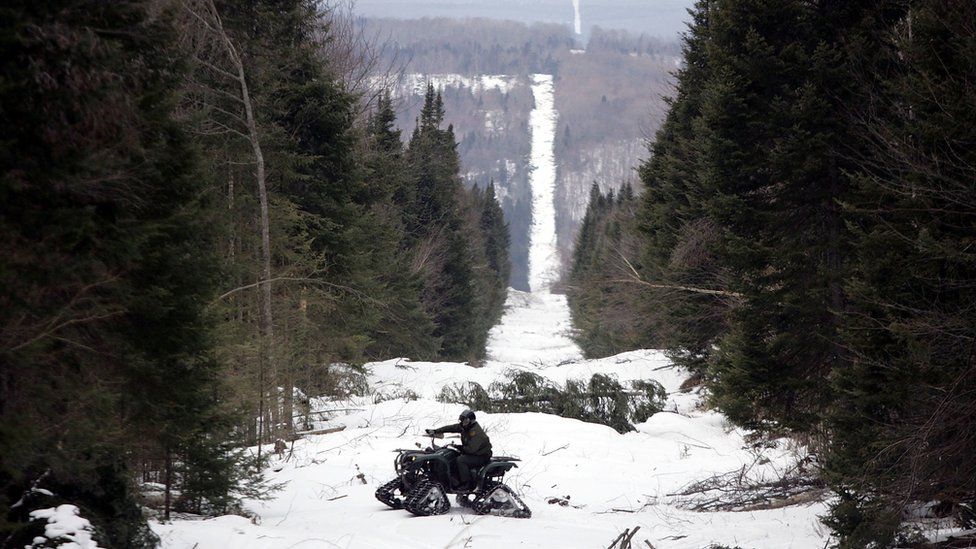Canada 's concerns about close border ties with US
- Published

The Canada-US border has become a fault line for Canadian fears surrounding the new US administration.
The uncertainty comes as Parliament considers a preclearance security bill that could give US border agents new powers and the Liberal government comes under pressure to reconsider an asylum pact with the US.
The US has made it clear secure borders are a top priority and while President Donald Trump has set his sights on Mexico and the Middle East, Canadians are still feeling a chill.
Pollster Nik Nanos, whose firm tracks Canadian attitudes towards the international boundary, said sentiment about the border is driven by two things - political rhetoric in the US and people's actual experiences at border crossings.
Both factors are driving anxiety as the new US administration begins to put its plans into practice.
Canadians took some 20 million trips to the United States in 2015 and report they are mostly well treated by US border and customs agents.
'I lost all my fingers': Asylum seekers make dangerous border crossing
But amid reports of border agents seizing and searching mobile devices, of people being questioned and turned away at the border and schools cancelling trips south, they are concerned about what Mr Trump's policies might mean for cross-border travel.
Mr Nanos said that even the "informal influence" of the president can have an impact on border crossings.
"The president does not have to pass an executive order to thicken the border. Trump has said he considers the border a sieve and if you're a border security person you're going to take that signal," he said.
Federal Public Safety Minister Ralph Goodale is expected to raise how travellers are being treated with his US counterpart, Homeland Security Secretary John Kelly, when they meet soon.
"Our expectation - on both sides of the border - is that travellers be treated with respect, and in accordance with the rule of law," said Mr Goodale's spokesman.
Meanwhile, the Trudeau government is trying to reassure people about Bill C-23, preclearance legislation currently before Parliament that is part of a bilateral agreement with the US. The US Congress passed its own version of the bill in December.
The US immigration preclearance operations have been in Canada for decades - an example of the deep co-operation between the two countries on border matters. The system allows travellers to conveniently pass through American customs sites set up in Canada and for the US to vet people before they set foot on US soil.
But lawyers are concerned about the powers Bill C-23, which will supersede the existing agreement, would give US border agents operating in Canada.
Toronto-based immigration lawyer Howard Greenberg says he worries the legislation contains provisions that might hinder the legal rights and freedoms of Canadian citizens.
Among the red flags Mr Greenberg sees in the bill are provisions that would allow American customs officials to detain and question people, to perform body searches on travellers, and to require people who wanted to withdraw from pre-clearance interviews to give a reason.
Currently a traveller has the right to leave the preclearance area with no consequence.
"You head for the curb, take a taxi home," said Mr Greenberg.
It would also allow US border agents to carry firearms and "restraint devices" at preclearance sites.
Public safety officials note that preclearance officers cannot place anyone under arrest, that they must operate in accordance with Canadian law, and that no right or power is conferred on border officers of one country and not the other.
They also say that allowing border agents to question people withdrawing from a preclearance area is necessary to avoid illicit "probing" of those sites by those who may be trying to detect weak points or deficiencies.
But Mr Greenberg says the bill, which still has time to be amended, needs to do more to clarify the rights of Canadians on Canadian soil, especially when a US administration talks about "extreme vetting" of migrants and refugees.
Ottawa is also under growing pressure to suspend the Safe Third Country Agreement amid increasing numbers of refugee claimants crossing illegally into Canada in Quebec, Manitoba and British Columbia.
That pact with the US states that refugee claimants are required to request protection in the first safe country they arrive in - a policy meant to better manage refugee claims and to avoid so-called "asylum shopping" between countries.
But it is also driving asylum seekers to make the illegal crossing to avoid being turned back to the US at official ports of entry.
More than 200 Canadian lawyers recently sent a letter calling on the Trudeau government to suspend the pact following Mr Trump's election.
Representatives from the Harvard Immigration and Refugee Clinic also wrote to the Liberal government this month asking for them to consider the "enforcement and implementation" of the STCA.
So far, the federal government is standing behind the agreement, which came into effect in 2004, saying the conditions of the agreement continue to be met.
- Published21 January 2017
- Published31 January 2017